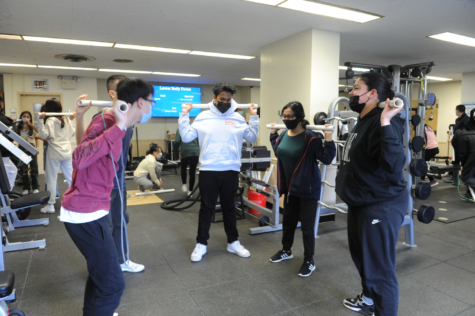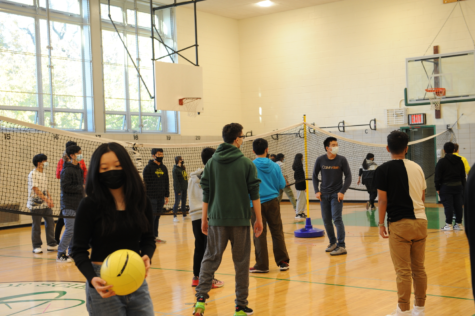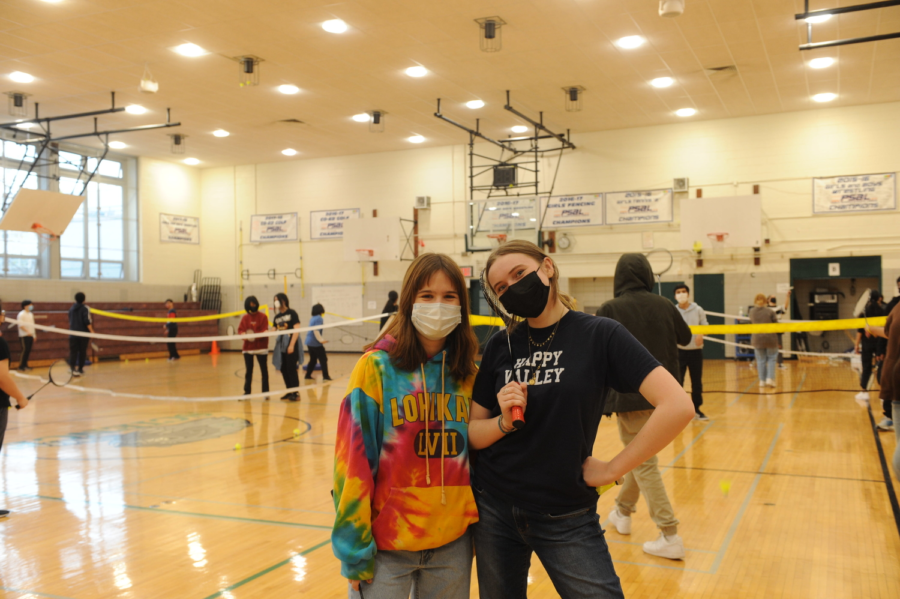Get Moving: Tips on How to Exercise More
Exercise can help with everything from your physical health to your mental wellbeing. We must take steps to overcome the obstacles that hinder us from getting physical activity.
Students get to play different sports and explore different forms of exercise in their Bronx Science Physical Education classes. Mr. Fallon said, “Here at Bronx Science, we have a high workload, with Advanced Placement classes and all the academic assignments. Exercise is a great way to help you to boost your mood, and it’s also a great stress management technique.”
You’ve probably heard it about a hundred times: exercise is good for you. It reduces the risk of practically every disease, reduces stress, and keeps you fit. It even generates endorphins – or as Ms. Konstantkakos, a Bronx Science Physical Education teacher calls it, “the happy hormone.”
Though we may feel hesitant to exercise, exercise can drastically improve our mood. Research has shown that regular exercise, specifically aerobic/endurance activities, can reduce the intensity of depression and anxiety. Exercise has even been shown to improve sleep quality, sharpen one’s cognitive thinking skills, and boost self-esteem and body image, not necessarily because of one’s appearance, but also because of the sense of accomplishment, noticeable progress, and the feel-good endorphins that are released.
Many people also exercise to reach their personal fitness goals or to train for their sports seasons. Cecilia Beauchamp ’25 said, “I like feeling accomplished and strong after each training session. I also like improving over time. I exercise because I’m an athlete and want to get stronger every day, not because I think I need to exercise to look a certain way.”
Bronx Science students feel the benefits of exercise when they incorporate it into their daily routines. Anna Buinski ’24 said “I think it’s a great source for stress relief and [for] bettering your health mentally and physically. I wish students had more time to exercise or be active, but it can be difficult to fit it in your schedule.”

When surveyed, many students cited laziness, tiredness, lack of free time, and a negative body image/mindset as factors that prevent them from exercising.
Monica Reilly ’24 said, “It’s time consuming and can become really difficult and tiring.” How could something that generates ‘happy hormones’ feel so difficult at times?
Oftentimes, our lack of time and motivation coupled with negative body images may hinder us from taking the first step (literally). A study from Johns Hopkins Bloomberg School of Public Health found that teenagers today get about as much (or rather as little) exercise as senior adults! These unhealthy habits were especially heightened during the Coronavirus pandemic, as many people fell out of their daily fitness routines and developed the notorious quarantine lifestyle. Isolated from friends, locked up at home, and with teenagers’ screen-times jumping through the roof, many began to develop a sedentary lifestyle and to eat more junk foods.
Later on, however, many people felt motivated to get moving more. In 2020, dumbbell sales grew tremendously and workout-session bookings skyrocketed. A survey conducted in May 2020 interviewed 2,000 people; 64% of those polled said they felt drawn to exercise more over quarantine.
“I think Bronx Science students want to be active. I know they do. I loved hearing how students were sleeping more and started to exercise on their ownvduring the COVID-19 pandemic,” said Mr. Dahlem, a Bronx Science Physical Education teacher, “I think that the barriers for us, however, is scheduling it in. I think it’s about making time for exercise.”
As we’re juggling homework, tests, and extracurriculars, getting enough physical activity is not always a priority. We’re not only pressed for time, but often drawn away by distractions. Time management plays a key role in finding time to squeeze in (at least) that recommended 60 minutes of physical activity.
Plan It
“If you want to make a change independently, you have to sit down and actually go through your schedule and make time for that new thing,” said Mr. Dahlem. Bronx Science students must start making time for physical activity because it can actually enhance our academic life when we purposely make time for it.
A 2010 study published in the British Journal of Health Psychology tracked the physical activity of three groups: the first was a control group, the second received information about the benefits of exercise to motivate them, while the third group was asked to plan how, when, and where they were going to exercise. In the next two weeks, only 38% of the control group and 35% of group 2 reported exercising, but a whopping 91% of those who planned the details of their workout ahead of time actually followed through.
The takeaway? It’s not enough to be motivated to exercise – you already know that exercise is good for you! Now you have to allocate time for it.
Moreover, don’t just plan when you will exercise, but plan how, where, and what you will do. Now that you have a set time, place, and plan, exercise will not just be another cloudy whim, making it much harder to avoid the task when the time does come around.
Of course, things don’t always go according to plan, so it’s helpful to have a backup plan in case something comes up. For example, saying, “If I can’t make it to the weight room today, then I will take a walk after dinner” can help you to reach your fitness goals.
Try incorporating physical activity throughout your daily routine; the amount of steps you take in a day could add up to a good amount of physical activity. Harvard Health recommends 7,500 steps per day to maintain overall health.
Goal-setting
Consistency is key to reaping the benefits of practically anything. But staying consistent in your fitness plans and goals is challenging, especially if you are seeking long-term changes.
When asked for tips on maintaining consistency, Bronx Science Physical Education teacher Mr. Fallon said, “It’s awesome to have a partner and to share a common goal, and to make little benchmarks throughout the way.”
Having just one big goal can be daunting, possibly hindering any attempts at progress at all. But setting and celebrating those benchmarks can motivate you to keep pushing towards the overarching goal.
When mental barriers demotivate and hinder you from taking that next step, remember why you started; having a bigger perspective can help you to push on through the pain and struggles. The struggles along the way are part of the process. Take time to celebrate the progress that you have made so far in order to motivate you to continue persevering.
Our bodies adapt remarkably fast to workout regimens, so know that progress will come if you keep sticking to it. After the first few weeks of exercising, your body starts adapting to the changes, your muscles start to rebuild themselves. Soon, you aren’t struggling as much with those curl-ups that were once so difficult.
Having ‘workout buddies’ can help with accountability and can make exercise much more enjoyable. Exercising with friends makes exercise a greater priority, because we are more likely to show up when someone is counting on us. Moreover, friends can provide encouragement to one another and cheer each other on. People who exercise with friends or family tend to exert more effort and exercise for longer too. This is because of our brain acting on social cues that prompt a positive response; if the people around us are positive and encouraging, we tend to produce better work.
Find Something Enjoyable
To ensure that you will follow through with your exercise plan, find something that you enjoy doing. As Mr. O’Hara, a Bronx Science Physical Education teacher said, “If you don’t like riding a bike, then don’t ride a bike. If you prefer to run instead, go out and run.”

Remember, exercise does not always have to be intense HITT cardio; it could be as simple as playing volleyball in the courtyard during a free period. Even something as simple as taking a walk outside can be extremely beneficial to one’s mental and physical health.
“One thing that I think you might not realize or take for granted are all the opportunities that we do have here at Bronx Science. Not just the wellness center, but to be a part of 40+ teams or groups … there are also clubs too,” said Mr. Dahlem. “Our Physical Education classes can open certain avenues for students to try, in terms of exercise.” Broaden your perspective on what exercise can be, and try different forms of exercise to find one that you enjoy.
“There are so many different ways to exercise, and if you say you don’t like to do it, then you just haven’t found a type of exercise that will work for you. It can make you so happy and can be a distraction from the stresses of everyday life,” said Beauchamp.
Appearance and Self-Esteem
Many students feel self-conscious about their bodies or fitness levels, which prevents them from even starting their fitness journey. Many feel that they can’t do it, or that exercise just ‘isn’t for me.’ Mr. Dahlem explains that we must “break through that stigma, that barrier.” Our bodies were made to move!
Mr. Dahlem said, “for anything that you do that’s fitness-related, it always deals with failure. You’re actually working out until you fail, or you’re doing something that’s difficult for a while, and then you improve.” Although it may be a rocky start, remembering that it is possible, encouraging yourself, and being around supportive people along your journey can help you to overcome those negative mindsets.
Even if you are working out to improve your appearance, avoid focusing too obsessively on your appearance. Shift your focus to how refreshed you feel after working out, how you’re doing something beneficial for your body, perhaps how your stamina has improved since you have started; learn to be nice to yourself. There are a number of other benefits to exercise outside of physical appearance.
Don’t compare yourself to the goal, because fitness is a process, and it will take time to get there. It is important to not set unrealistic goals, or to beat yourself up when you can’t meet your goals.
Over quarantine, fitness programs such as YouTuber Chloe Ting’s ‘Get Abs in 2 Weeks’ workout plan gained millions of views, leading many young people to start working out more. Such videos and titles sound extremely appealing, but it can take a toll on those struggling with body image.
However effective these programs may be, remember that fitness models have either spent years trying to look the way they look, or are genetically predisposed to looking like that. You do not have to be skinny or have defined muscles to be beautiful. Ting herself noted that while ab muscles are being strengthened and developed through the workouts, “Most people won’t get the shredded defined abs look in two weeks.”
Titles as promising as “Get Abs in 2 Weeks” can destroy one’s self-esteem, particularly within young teenagers. Sentiments such as these should be taken with a grain of salt. We are all at different stages of fitness; do not compare yourself to fitness models and the stage that they are at.
It’s important to exercise and to get enough physical activity. Staying active and healthy is important, but the picture of health is more than skin-deep. Remember that your worth is found in so much more than your appearance. Exercise with the intent of maintaining your body physically, mentally, and emotionally. Learn to appreciate your body and all that it can do; work with your body, not despising it for its limits, but learning to grow and expand the limits. If you have a goal in-mind, continue striving to reach it, but learn to love the process of getting there as much as the destination. Fitness is a journey and results will not come overnight; continue taking those small steps each day and celebrating the progress you have made!
Nutrition
“Many student-athletes don’t have the right information about nutrition. It can affect not just your strength but also can affect your fitness, your stamina, and can actual causing the body sometimes to have certain types of injuries” said Coach Mr. Khaled Mahmoud, a Bronx Science Biology teacher and the coach of the Girls’ Junior Varsity Soccer team.
Nutrition is a key factor of fitness. It is crucial to supply your body with the necessary fuel and energy. Lack of proper nutrition can make you tired.
“This is the mistake that many student athletes make. They skip lunch, and then they go to practice. This can affect their performance and their health as well,” said Coach Mahmoud.
A common fallacy among student-athletes is that training requires increased protein intake. But Mr. Mahmoud clarifies that protein is only necessary for sports that require muscle-building. For endurance sports, such as soccer and track, more complex carbs – such as nuts, whole-grains, and steel-cut/rolled oats – should be incorporated into an athlete’s diet to ensure sufficient energy levels.
Coach Mahmoud ended his interview with advice about trying new sports. “You have to be aware of your body. See if it is the right sport for your body, from a physical point of view.” If you do not have the best fitness, he said, “You have to take it gradually.”
Remember to take rest days every 3-5 days to give your body time to rebuild itself and to prevent muscle fatigue and injury. Time is just another part of the process, so take it step-by-step. Regardless of how quickly results may come, there are a myriad of physical, mental, and emotional health benefits that accompany fitness every step of the way.
There are numerous opportunities to get moving at Bronx Science, from our high quality Physical Education classes to casual courtyard sports you can play with your friends. Exercise may be grueling at first, but you can make it a habit, and even a hobby, by finding a form of exercise that you enjoy, taking it step-by-step, encouraging yourself and others, exercising with friends and family, and of course, by purposely making time for it.
“There are so many different ways to exercise, and if you say you don’t like to do it, then you just haven’t found a type of exercise that will work for you. It can make you so happy and can be a distraction from the stresses of everyday life,” said Cecilia Beauchamp ’25.
Jacey Mok is an Editor-in-Chief for 'The Science Survey.' She loves the art of masterfully crafting a story and bringing the reader into the scene. She...
Charlotte Zhou is an Editor-in-Chief for ‘The Science Survey.’ In addition to writing and editing articles, she constructs the online crossword and...
Nehla Chowdhury is an Editor-in-Chief for 'The Science Survey,' as well as a Social Media Editor. Nehla enjoys researching topics for their articles, as...
Louisiana Stahl is a Chief Graphic Designer and Athletics Section Editor for ‘The Observatory' yearbook and a Staff Reporter for 'The Science Survey'...

